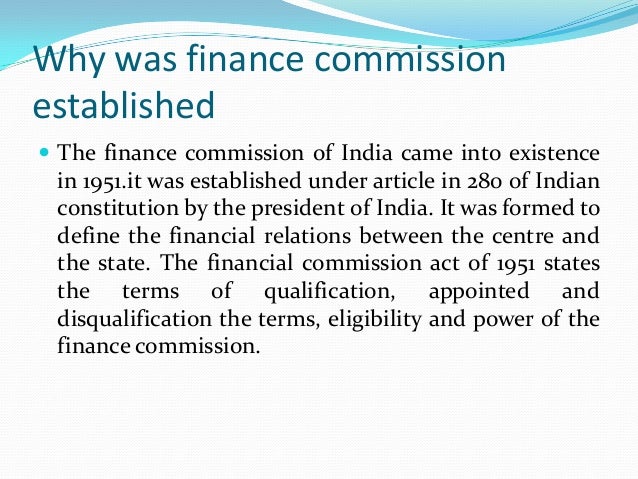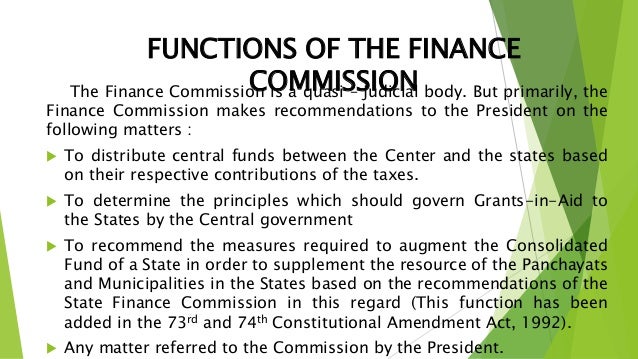FINANCE COMMISSION

Although the Constitution has made an effort to allocate every possible
source of revenue either to the Union or the States, but this allocation
is quite broad based. For the purpose of allocation of certain sources
of revenue, between the Union and the State Governments, the
Constitution provides for the establishment of a Finance Commission
under Article 280. According to the Constitution, the President of
India is authorized to set up a Finance Commission every five years to
make recommendation regarding distribution of financial resources
between the Union and the States.
Constitution
 Finance
Commission is to be constituted by the President every 5 years. The
Chairman must be a person having 'experience in public affairs'. Other
four members must be appointed from amongst the following:-
Finance
Commission is to be constituted by the President every 5 years. The
Chairman must be a person having 'experience in public affairs'. Other
four members must be appointed from amongst the following:-
1.A High Court Judge or one qualified to be appointed as High Court Judge;
2.A person having knowledge of the finances and accounts of the Government;
3.A person having work experience in financial matters and administration;
4.A person having special knowledge of economics
Functions
 The
Finance Commission recommends to the President as to the distribution
between the Union and the States of the net proceeds of taxes to be
divided between them and the allocation between the States of
respective shares of such proceeds; the principles which should govern
the grantsin-aid of the revenue of the States out of the Consolidated
Fund of India ,the measures needed to augment the
The
Finance Commission recommends to the President as to the distribution
between the Union and the States of the net proceeds of taxes to be
divided between them and the allocation between the States of
respective shares of such proceeds; the principles which should govern
the grantsin-aid of the revenue of the States out of the Consolidated
Fund of India ,the measures needed to augment the
Consolidated Fund of a State to supplement the resources of the
Panchayats and Municipalities in the State any other matter referred to
the Commission by the President in the interest of sound finance.
STATE FINANCE COMMISSION
Article 243I of the Indian Constitution prescribes that the Governor of a
State shall, as soon as may be within one year from the commencement of
the Constitution (Seventy-third Amendment) Act, 1992, The State Finance
Commissions are constituted once in five years to review the financial
position of the local bodies and to recommend principles governing the
distribution of finances between the states and local bodies and
measures needed to improve the financial position of the local bodies.
As per the constitutional requirement, states made the provision in the
state panchayat raj/municipal Acts for the constitution of State Finance
Commissions. Most states, however, have left it to the state
governments to prescribe the details of composition, qualifications,
term, etc. The states have mostly incorporated the constitutional
provisions in their Acts. In some cases the details of the composition,
working procedures and other related aspects were also incorporated in
Acts or Rules framed there under. In some cases certain qualifications
have been prescribed and others they were left open. This resulted in
wide variations between the State Finance Commissions and left much
scope for variations in their appointment, organization and working.
The principles which should govern:
The distribution between the State and the Panchayats of the net
proceeds of the taxes, duties, tolls and fees leviable by the State,
which may be divided between them under this Part and the allocation
between the Panchayats at all levels of their respective shares of such
proceeds; The determination of the taxes, duties, tolls and fees which
may be assigned as, or appropriated by, the Panchayats; The
grants-in-aid to the Panchayats from the Consolidated Fund of the State;
The measures needed to improve the financial position of the
Panchayats: Any other matter referred to the Finance Commission by the
Governor in the interests of sound finance of the Panchayats. Article
243Y of the Constitution further provides that the Finance Commission
constituted under Article 243 I shall make similar recommendation
vis-a-vis municipalities.
The Governor is required to cause every recommendation made by the State
Finance Commission together with an explanatory memorandum as to the
action taken thereon to be laid before the Legislature of the State.

Post a Comment
Post a Comment